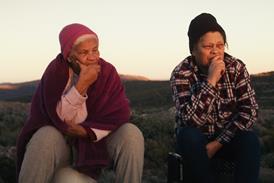Dir/scr: Bernard Emond. Can. 2007. 89mins.
Having regained faith in God, against all odds, in La Neuvaine, Canadian anthropologist-turned-film-maker Bernard Emond, sets out, in the second part of his trilogy Faith-Hope-Charity, to retrieve hope where there is none. No wonder the original French, and much more suitable, title for Summit Circle is Against All Hope. It is not an easy task, but if Emond does not quite pull through, he can always rest assured of top candidacy for any festival's Ecumenical Award
Tracing the Job-like fate of a Montreal woman, from almost paradisiacal promise to utter despair, Emond attempts to argue, with almost Biblical temerity, that there is light at the end of the tunnel (or at least that one should never give up looking for it). Needless to say, faith is essential here, where nothing much else is left for the protagonist to lean on.
A righteous, well-intentioned and terribly earnest kind of parable which could resonate with an older audience, it looks likely limited theatrical distribution will be followed by a far more extensive one on TV.
Rejeanne (Tremblay), a switchboard operator, and her husband, Gilles (Jodoin), have just taken possession of their dream home by the lake, with a gorgeous view of the mountains and a glorious garden to boot, when he suffers a first stroke and remains partly paralysed.
Next, as the couple somehow learns to adjust, helped by the dedicated assistance of a friend (Roy), fate strikes again. Rejeanne, with all the rest of the switchboard girls, is fired, while the company she worked for is restructured to increase profits for its owners. Gilles, now unable to drive a truck, goes back to work in a gas station, suffers a second stroke and is further incapacitated.
While bravely coping with her husband's impaired condition and the psychological effect it has on him, Rejeanne tries first for a job with Wal-Mart, a sequence which provides the only ironic glimmer in the proceedings, then moves to a catering company as a waitress. Then, one night, she is picked up by the police, her face covered with blood, after having taken several shots at a palatial mansion. Interrogated, she retreats into obstinate silence, even after her husband is revealed to be dead, refusing to utter one single word.
Told in the form of an investigation which starts with Rejeanne's arrest and goes back in time, it follows the lead police detective interviewing people who have been in contact with the couple at various points in the past, then slips into long flashbacks that are far more detailed than anything those witnesses had to say.
As it goes on, the plot drives inexorably towards an ending that is obvious about halfway through, improbably squeezing at the final moment a tentative act of faith which belies Emond's constant denials that he might be personally religious in any sense.
Evidently a moral parable, Summit Circle is intended to show the audience that, despite all the tragedy and injustice abundant in the modern world, there must be cause to go on, - even if Emond does not explicitly explain why. One needs to look beyond the silence, which prevails here. It provides a retreat for Gilles, who has been struck down and can't function any more; for Rejeanne, who won't talk after everything she had undergone; and even for God, who remains silent and impassive when Rejeanne steps into a church.
The problem with Emond's script is that it looks too much like an academic sermon, reaching the same conclusion suggested by La Neuvaine: God is the only one to turn to when everything else fails. Sceptical audiences might not be taken in by all this: all the events contained within the film are neatly organised, in perfectly ordained manner, and no incident is allowed to interfere with the downward spiral of destiny dealt to this couple.
Bright and clean camerawork, never less than handsome, art direction that banishes anything less than decorous color patterns and a genteel soundtrack that never offends the ear, surround the correct but unexciting performances. It makes for a distinct let-down from the strong thespian presence which distinguished his previous effort.
Production company/backer
Corporation ACPAV
International sales
Seville Pictures
Producer
Bernard Payeur
Cinematography
Jean Claude Labreque
Editor
Louis Cote
Production design
Gaudeline Sauriol
Music
Robert Marcel Lepage
Main cast
Guylaine Tremblay
Guy Jodoin
Gildor Roy
Rene-Daniel Dubois
Serge Houde
Jasmine Dube
Annick Bergeron
Carmen Sylvestre
Yael Guazo
Evelyne Gelinas



















No comments yet